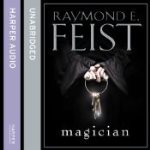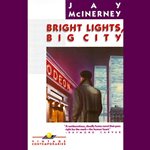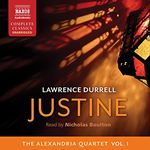Magician
by Raymond E. Feist
narrated by Peter Joyce
"War is coming to the Kingdom of the Isles from another world, bringing with it chaos and destruction. Pug yearns to train as a warrior and fight for his kingdom alongside his foster-brother, Tomas, but instead he is forced to follow a different path: a path that will lead him right into the heart of the enemy."An epic read in more ways than one - 36 hours listening to a fantasy saga containing humans, elves, goblins, dwarves etc. which calls to mind Lord of the Rings but is immensely inferior. It didn't help that it also reminded me of sections of the Iliad that just described fighting, and not only am I not interested in combat tactics but there's also too much killing in the real world to allow for any tolerance of fictional killing. It was good enough, but no more.
Bright Lights Big City
by Jay McInerney
narrated by Daniel Passer
"A young man with nothing but goodwill, controlled substances, and wit to sustain him in his quest, runs until he reaches his reckoning point, where he is forced to acknowledge loss and, possibly, to rediscover his better instincts."The whole book is written in the second person (e.g. "you run until you reach your reckoning point") which is a really strange idea that took quite a bit of getting used to. Aside from that quirk, it's a fairly readable account which had me rooting for the protagonist even though he is behaving pretty badly, but mostly harming only himself, for which the likely reason is revealed towards the end. I can see why this was on the Classics list (probably also because of the second person thing), and I wondered if the title came from something well known or whether this is the origin of the phrase? So, no need to wonder, I turned to the Interwebs and it was the title of a song written in 1961.
Justine
by Lawrence Durrell
narrated by Nicholas Boulton
"Set in the sensuous, hot environment of Alexandria just before the Second World War. Within this polyglot setting of richly idiosyncratic characters is Justine, wild and intense, wife to the wealthy businessman Nessim."What a huge disappointment this was. For some reason I thought this would be a book that I'd really enjoy, but I came within a hair's breadth of actually giving up without finishing it. There was lots of lovely prose, delicious adjectives and atmospheric evocation of the location, but by two-thirds of the way through hardly anything had actually happened. I made it to the end, and can summarise the plot as 'several people have affairs with one another in Alexandria, three of them die, then they all go their separate ways'. Avoid.
The Art of Reflection
by Ratnaguna
"Ratnaguna offers practical and specific advice on reflection as a spiritual practice. He also demonstrates its great value—not just as a part of life, but as a way of reminding oneself of life's true meaning."We were studying this book in my Monday Buddhism group, and for a change it contains material that I actually understand and can relate to my own practice. Unlike meditation, reflection allows structured thinking, but towards the end we are introduced to contemplation, which takes me back into the more difficult zone of non-thinking. I have learned not to try to apply everything I encounter within Buddhism, and to appreciate the particular qualities of my own mind and how that differs from the descriptions I read of how minds might operate, without letting myself off the hook with 'I can't do that'. But a lot of this Buddhist mind work (and body work) is beyond me, and I suspect it will remain that way for a long time, if not always.







